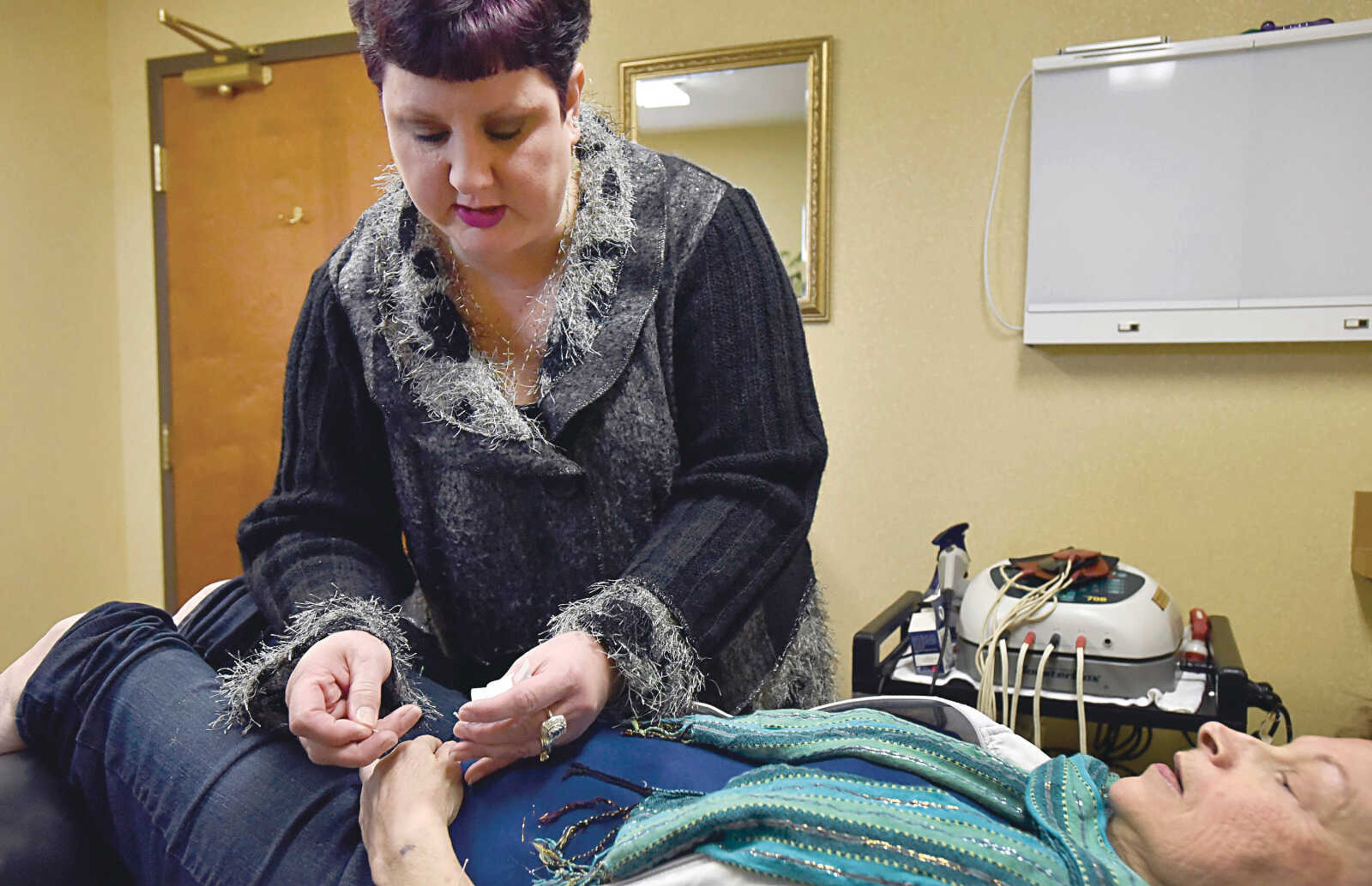Getting to the point: Local individuals look to acupuncture, alternative methods for healing
Dr. Anne Heisserer talks freely with her patient as she glides about her business, first inserting needles into his toes, feet, arms, ears and forehead before finishing with the scalp. As much as the pins piercing the skin catch one's fascination, the absence of reaction is just as noticeable...
Dr. Anne Heisserer talks freely with her patient as she glides about her business, first inserting needles into his toes, feet, arms, ears and forehead before finishing with the scalp.
As much as the pins piercing the skin catch one's fascination, the absence of reaction is just as noticeable.
There is no pain. There is no blood.
Her unflinching patient, 56-year-old Tim Coad of Cape Girardeau, is relaxed and comfortably talks as Heisserer performs a form of Chinese medicine that traces back more than 2,000 years.
Coad has become comfortable with the treatment, something he has been receiving on a weekly basis for the past three months to address insomnia, tinnitus and anxiety, conditions he associated with a 30-pound weight loss over the summmer.
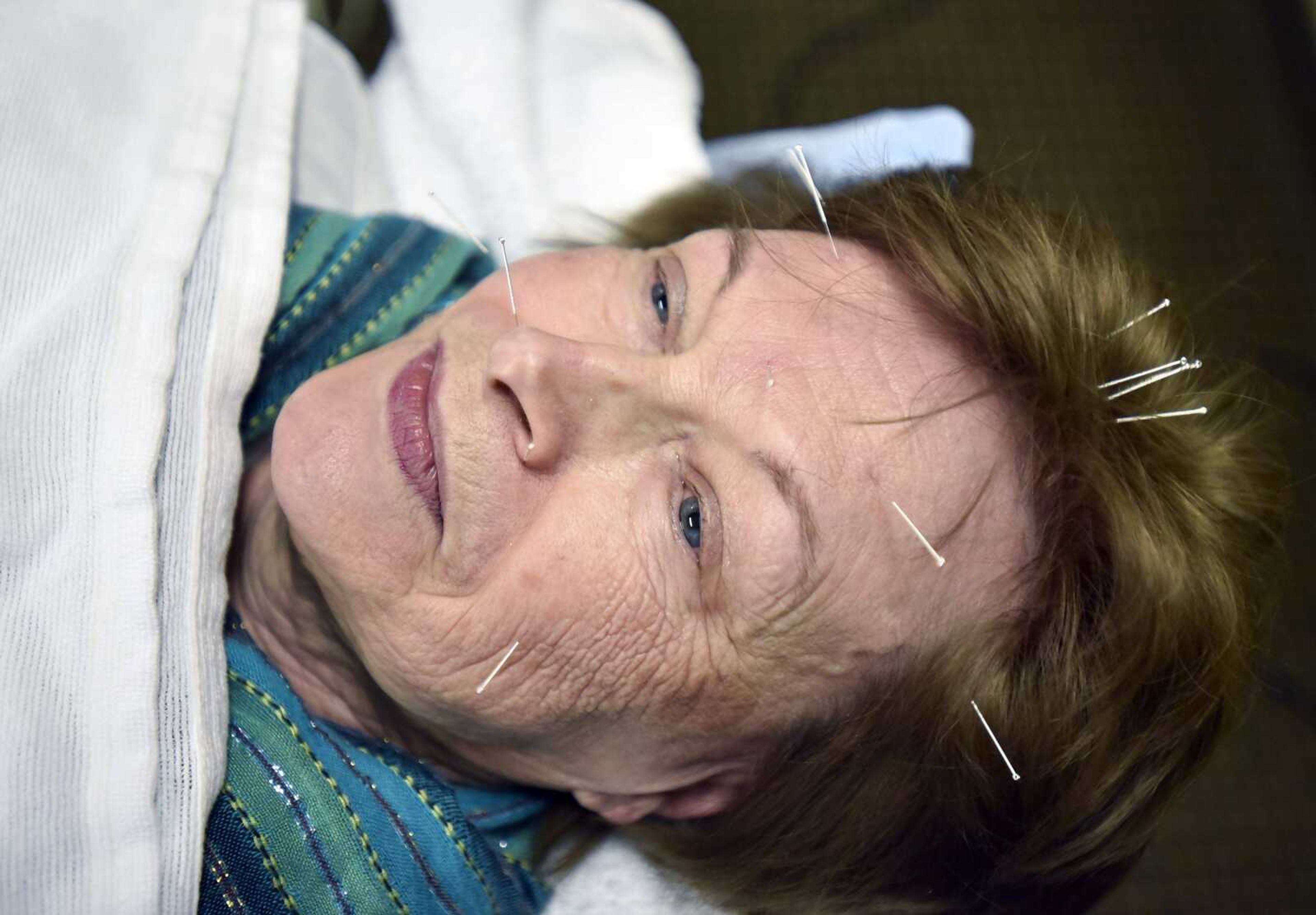
"I think I got my body chemistry off a little bit because I was struggling with sleeping," Coad says. "It's almost like I couldn't sleep at night, and I was a guy that could sleep pretty much anytime, anywhere, and my ears started ringing through this."
Coad came to see Heisserer, a chiropractor, to deal with an ongoing neck condition he sustained in high school, thinking an adjustment might help with the high and low frequency squelching that had replaced some of his hearing.
"So she adjusted my neck, and she said, 'I can do something for the ringing in your ears and probably help relax you,'" Coad says. "I was full of paranoia and struggling. She did the acupuncture, and at that moment I felt kind of 'Whhhhhhheww' ... I was able to take a deep breath and kind of chill out. So ever since then I've been getting the acupuncture done."
With lights dimmed and soothing music playing, he would be covered with a warm blanket and rest for about 30 minutes before the removal of the needles.
A couple doors down, 73-year-old Shirley Bentley, also of Cape Girardeau, waited for treatment. Her maladies ranging from chronic allergies to fibromyalgia, she sometimes seeks conventional chiropractic adjustments, but on this day she eagerly awaits Heisserer and a fresh set of sterile needles.
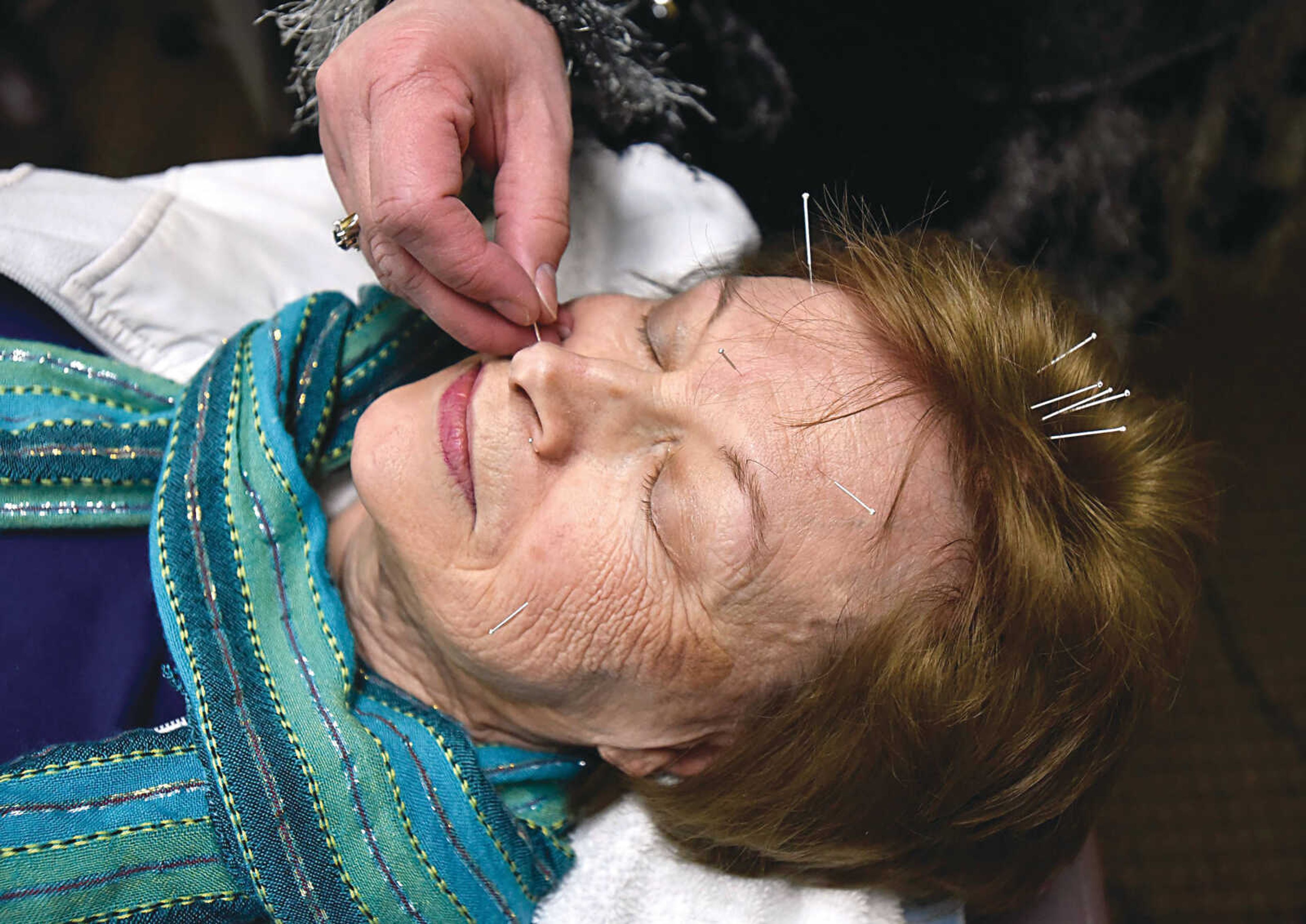
"The chiropractic is kind of in spots, but the acupuncture is like the whole body," Bentley says before her treatment. "It's all over, so I think that's why it's good the way it is. Most time a little bit of both, but sometimes it's like I don't need the acupuncture. Sometimes I just need the acupuncture."
On this particular day she is there for treatment of her sinuses, and soon she is talking and smiling with multiple needles in her cheeks, forehead and scalp.
"It really helps, and if you have a headache or anything, it's a good thing for that," Bentley says.
She also experiences sporadic widespread pain throughout her body, one of the symptoms of fibromyalgia, when the weather turns cold.
While insurance plans usually do not cover the cost of acupuncture, which is considered alternative treatment or self-maintenance, much like massage therapy, it is a preferred treatment for some like Coad and Bentley, who both try to avoid medication unless absolutely necessary.
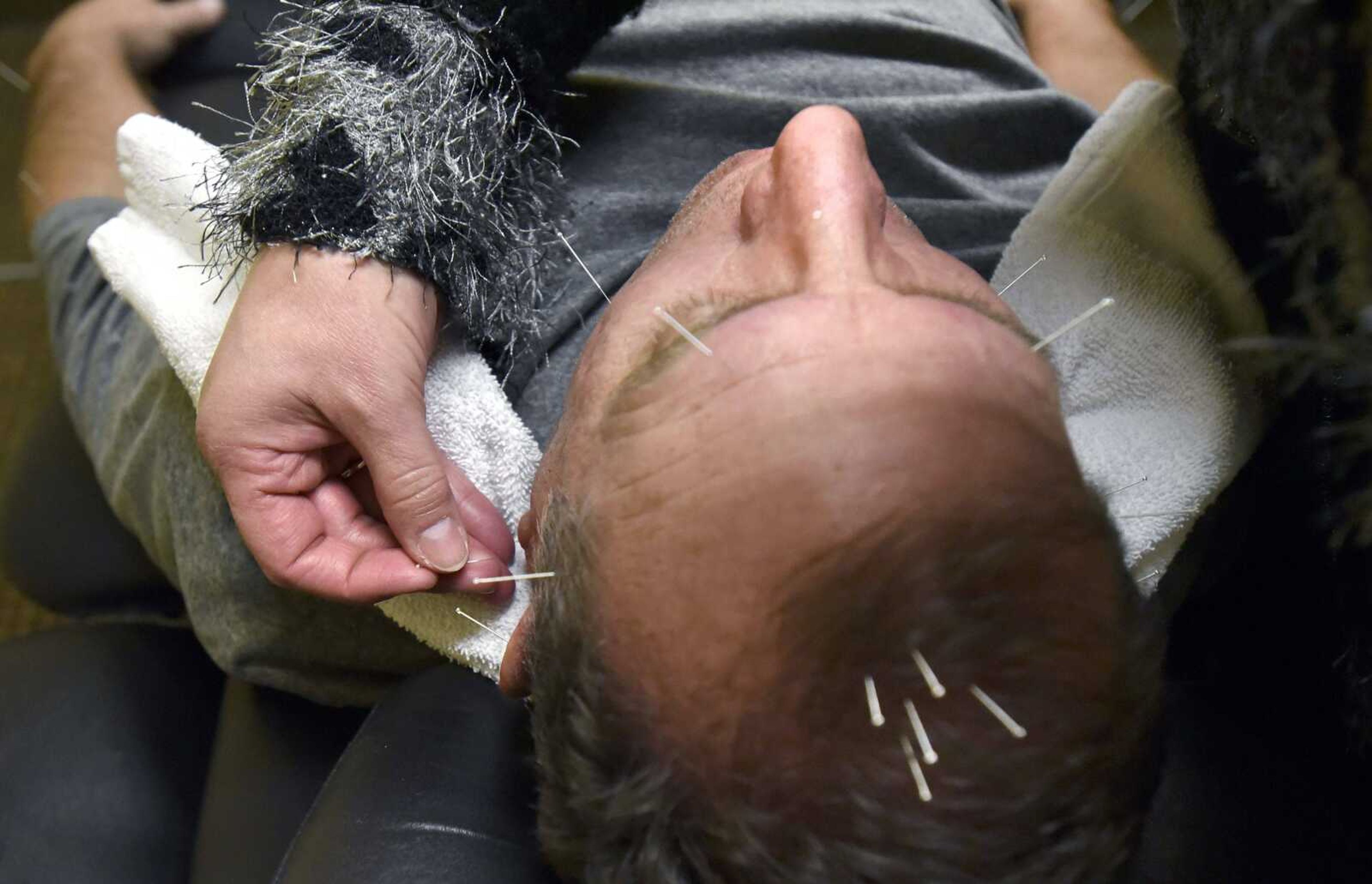
Chiropractic adjustments have gained traction in the medical field and often are covered by insurance, but Heisserer said many insurers take the stance that acupuncture is "not clinically proven" in the scientific community.
However, according to the National Institute of Health (NIH), part of the Department of Health and Human Services (HHS) and the second largest supporter of research and development in the federal government, acupuncture is an effective treatment for muscle, bone and nerve pain, addictions and weight loss, as well as digestive, circulatory and respiratory conditions.
"Most people, when they come in here, they say, 'Acupuncture is my last resort,'" Heisserer says. "They've already tried everything else. This helps so much stuff. You literally can treat anything."
Heisserer said about 80 percent of her patients are female, and about 30 to 40 percent of her patients have acupuncture treatment. She says women generally are more open to the treatment than men.
"Seriously, they don't have the needle phobia as much as men," Heisserer said. "Seriously, if I'm in a room and I even bring it up to some of these guys, and they're like, 'No, you're not poking me with a needle. ... Some of them will say 'voodoo,' but most of them will say 'I'm scared of needles.' That's their biggest thing, but they're teeny, tiny, little-bitty needles. They're not injecting anything. I mean, I can't even tell you how skinny these things are. It's not like a syringe they're putting in your vein and sucking blood out so it has a hole in the middle to do so."
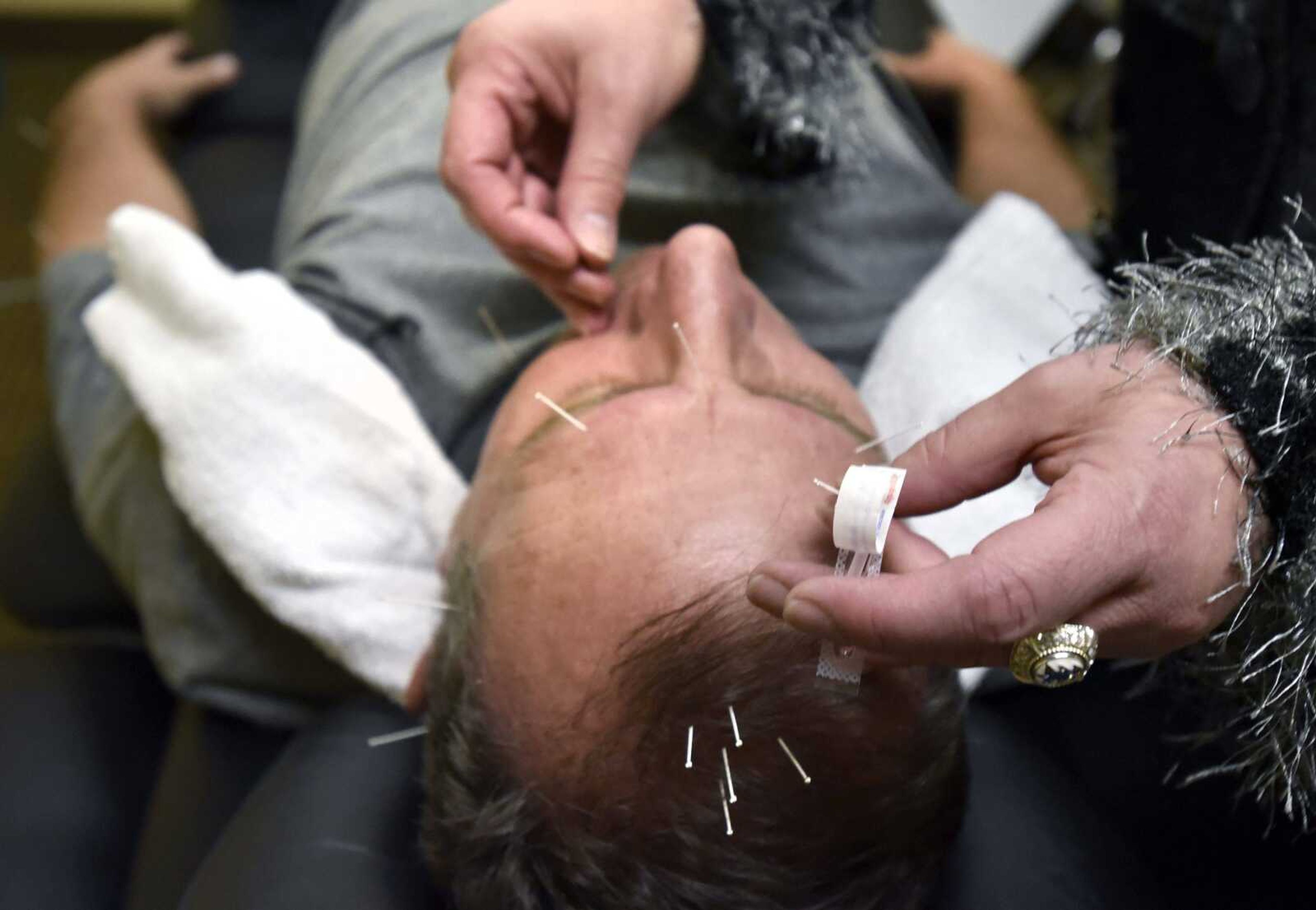
Heisserer pursued her profession after receiving chiropractic treatment following her experience in an automobile accident in her early 20s. She received her degree from the Logan University College of Chiropractic in Chesterfield, Missouri, in December of 1996. Although she had never had acupuncture performed on her, she was intrigued by the treatment and specialized in it during her three and a half years at the school.
Acupuncture is based on energy flow of the body, which travels through meridians. Over the past 20 years, she has used it as treatment in a spectrum ranging from smoking addiction to the preparation for childbirth.
"You can literally treat anything because it's all based on the energy in your body and moving it around," Heisserer said. "The ones that I see the most are lower back pain, sinus and allergy issues, migraines, fertility, stress, anxiety, depression, herniated discs."
She uses neuropathy, which often involves a tingling numbness in a foot or leg, as an example of the way acupuncture affects the meridians.
"I've found that if I do the opposite leg, that will help pull energy to the other leg," Heisserer said. "Sometimes the patients are having too much energy in that leg and that's why they're having the neuropathy, that you pull it over to the opposite leg and that will take some of it away. And those points go all the way down the leg into the feet also."
In acupuncture, points are associated with particular problems and regions of the body. She uses her placement of needles for smoking addiction as an example.
"Those are mainly in the ear, and some on the feet and some on the arms," Heisserer said. "The principle behind that is, like, addiction points. It helps take away the craving. Most patients say it makes cigarettes taste bad. Now I have found that if they really, really don't want to quit, they can override that and keep going, but most of the time it does help."
This could bring the effectiveness in question for skeptics. In a world of measurable science, acupuncture effects are generally viewed as a placebo. While some clinical studies might find favorable results, they are considered outliers. Proponents of acupuncture will counter that advanced Western medicine does not fully understand the Far Eastern method, and therefore cannot measure it scientifically.
For some who have had the treatment, it's a viable alternative with what they believe to be beneficial results.
Coad says he's sleeping better these days, and the ringing in his ears has become more tolerable. He says he has had success with another condition in the past.
"I think it helped with the sinuses. It does," Coad says. "I don't know if I completely understand the science behind it all, but it's a treatment I would prefer over medication. Its nice heat, relaxation and stimulation, I think, are more natural than medication."
Bentley is thankful for conventional medicine.
"Medical doctors are great," she says. "I have a great doctor, too. She's wonderful."
But she wants to limit medications -- she says she takes just one -- and views acupuncture as an alternative.
"I feel it immediately. I don't know, it's a sense of well-being. Like, 'Oh my goodness,' sometimes I think, 'Oh, maybe I'm 30,'" she says with a laugh, "and not what I am."
Connect with the Southeast Missourian Newsroom:
For corrections to this story or other insights for the editor, click here. To submit a letter to the editor, click here. To learn about the Southeast Missourian’s AI Policy, click here.

